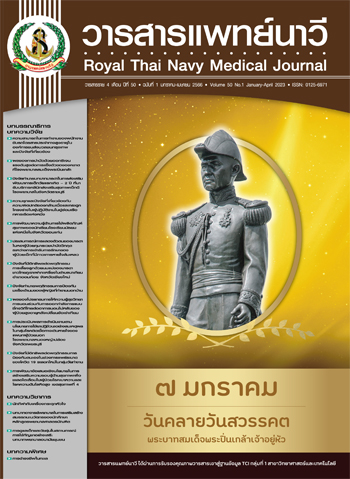ปัจจัยทำนายบทบาทมารดาในการส่งเสริมพัฒนาการเด็กวัยแรกเกิด – 2 ปี ที่มารับบริการคลินิกส่งเสริมสุขภาพเด็กดี โรงพยาบาลในจังหวัดราชบุรี
Main Article Content
บทคัดย่อ
การศึกษาครั้งนี้เป็นวิจัยเชิงพรรณนาแบบภาคตัดขวาง เพื่อศึกษาปัจจัยทำนายบทบาทมารดาในการส่งเสริมพัฒนาการเด็กวัยแรกเกิด - 2 ปี ที่มารับบริการคลินิกส่งเสริมสุขภาพเด็กดีในโรงพยาบาลจังหวัดราชบุรี โดยประยุกต์ใช้แบบจำลอง PRECEDE-PROCEED เป็นกรอบแนวคิด ใช้วิธีการสุ่มเลือกตัวอย่างแบบหลายขั้นตอน ได้กลุ่มตัวอย่างเป็นมารดาที่มีบุตรแรกเกิด - 2 ปี จำนวน 147 คน จาก 4 โรงพยาบาล เก็บข้อมูลด้วยแบบสอบถามแบบมาตรประมาณค่า มีค่าความตรงของเครื่องมือทั้งหมดอยู่ระหว่าง 0.70 - 0.90 และค่าความเที่ยงอยู่ระหว่าง 0.64 - 0.76 ระยะเวลาการเก็บข้อมูลเดือนมีนาคม - มิถุนายน 2564 และทำการวิเคราะห์ข้อมูลด้วยสถิติเชิงพรรณนาไคสแควร์ และสถิติถดถอยโลจิสติกทวิ
ผลการวิจัย พบว่า กลุ่มตัวอย่างส่วนใหญ่มีการปฏิบัติบทบาทมารดาในการส่งเสริมพัฒนาการเด็กระดับสูง ร้อยละ 93.9 และปัจจัยทำนายบทบาทมารดา ได้แก่ ระดับการศึกษาของมารดา (ORadj = 10.93, p = .013) ความรู้เกี่ยวกับพัฒนาการเด็กและการส่งเสริมพัฒนาการเด็ก (ORadj = 8.56, p = .018) และการได้รับคู่มือประเมินและส่งเสริมพัฒนาการเด็ก (DSPM/DAIM) (ORadj = 6.16, p = .001) คำแนะนำ คือ พยาบาลควรส่งเสริมให้มารดาที่เข้ารับบริการในคลินิกสุขภาพเด็กดีมีความรู้ร่วมกับกระตุ้นมารดาให้ใช้คู่มือประเมินและส่งเสริมพัฒนาการเด็ก
Article Details

อนุญาตภายใต้เงื่อนไข Creative Commons Attribution-NonCommercial-NoDerivatives 4.0 International License.
เอกสารอ้างอิง
Office of the National Economic and Social Development Council. Indicators according to the National Economic and Social Development Plan No. 12. [Internet]. [cited 2019 August 23]. Available from: https://planning2.mju.ac.th/goverment/20111119104835_planning/Doc_25591028114245_549094.pdf. (in Thai).
Kue-iad N, Chaimay Bh, Woradet S. Early childhood development among Thai children aged under 5 years: a literatures review. The Southern College Network Journal of Nursing and Public Health 2018;5(1);281-96. (in Thai).
Sankkhaw S, Mekrungongwong S. The effect of a perceived self-efficacy promoting program on perceived self-efficacy, outcome expectations, and preschool child development promotion behavior in caregivers with ineffective development promotion behavior in Mueang Sukhothai district, Sukhothai province. Royal Thai Navy Medical Journal 2022;49(1):95-117. (in Thai).
National Institute of Child Development. Situation of early childhood development in 2019. [Internet]. [cited 2019 February 3]. Available from: http://nich.anamai.moph.go.th. (in Thai).
Udomwattakul Y. Factors affecting development of the preschooler in child development center in Doi Tao district, Chiang Mai province. [Master’s Thesis, Faculty of Nursing]. Chiang Mai University; 2011. (in Thai).
Koniak - Griffin D. Maternal role attainment. J Nurs Scholarsh 1993;25(3):257-62.
Mercer RT. Becoming a mother versus maternal role attainment. J Nurs Scholarsh 2004;36(3):226-32.
Thitimapong B, Keawpimon P, Kritcharoen S, Sripotchanart W. Maternal-infant attachment and postpartum adaptation to motherhood of the first-time adolescent mothers. Songkla Med J 2010;28(4):179-90. (in Thai).
Department of Health, Ministry of Public Health. The miracle of the first 1,000 days of life. [Internet]. [cited 2020 February 20]. Available from: https://bkpho.moph.go.th/bungkanpho/uploads/media/201802151014121941.pdf. (in Thai).
Green LW, Kreuter MW. Health program planning: an education and ecological approach. 4th ed. New work: McGraw-Hills; 2005.
Puttapitukpol S. Life experiences of adolescent mothers who do not plan pregnancy: a phenomenological study. Journal of Nursing Sukhothai Thammathirat University 2004;1(1):53-63. (in Thai).
Paravej U. The relationship between attitudes towards parenting, support from mother's mother adolescents in the maternal role adaptation of adolescent mothers. [Master’s Thesis, Faculty of Nursing]. Mahidol University; 1990. (in Thai).
Hongsai T, Kraikitraj A. Environmental management for supporting executive functions in early childhood. Journal Education, Silpakorn University 2021;18(1):31-50. (in Thai).
Department of Health, Ministry of Public Health. Developmental surveillance and promotion manual (DSPM). [Internet]. [cited 2019 August 31]. Available from: http://nich.anamai.moph.go.th/download/DSPM.pdf. (in Thai).
Department of Health, Ministry of Public Health. Developmental assessment for intervention manual (DAIM). [Internet]. [cited 2019 August 28]. Available from: https://thaichilddevelopment.com/ebook/DAIM%2010.04.2562.pdf. (in Thai).
Imnamkhao S, Imnamkhao W. Integrative literature review: nurse’ role for child health promotion in early childhood. Royal Thai Navy Medical Journal 2022;49(1):198-221. (in Thai).
Faul F, Erdfelder E, Lang AG, Buchner A. G*Power 3: a flexible statistical power analysis program for the social, behavioral, and biomedical sciences. Behav Res Methods 2007;39(2):175-91.
Cohen J. Statistical power analysis for the behavioral science. 2nd ed. Hillsdale: Lawrence Erlbaum Associates; 1988.
Satipan C, Sriareporn P, Sansiriphun N. Marital relationship, father-infant attachment and father involvement in postpartum period. Nursing Journal 2016;43(Suppl December):71-81. (in Thai).
Phongphetdit B, Authawee B. Factors affecting the development of early childhood Thailand: Public Health Region 5. Kuakarun Journal of Nursing 2020;27(1):59-70. (in Thai).
Polgaya O, Choolert P. The effect of the maternal roles promoting program by family support on attitude and maternal roles among adolescent mothers. Journal of Health Research and Innovation, Boromarajonani College of Nursing Suratthani 2019;2(1):131-42. (in Thai).
Chandate C, Santati S, Wittayasooporn J. Factors predicting mother’s abilities to take care of children under one year of age in Bangkok metropolis. Rama Nurs J 2015;21(1):21-37. (in Thai).


